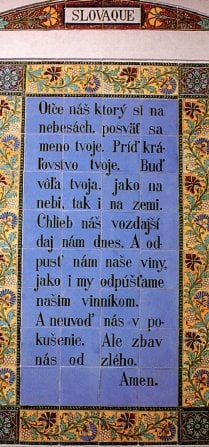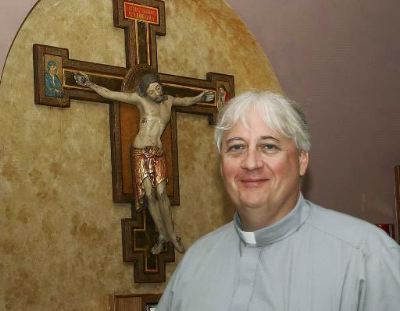Outside Jerusalem, you can visit an unusual church that could be one of the most important – and most overlooked – in the world. It’s a little off the beaten path. Unlike most churches in the Holy Land, this one doesn’t pay tribute to a saint, or honor a miraculous event.
This one pays tribute to a prayer.
In fact, as far as I know, it’s the only church in the Holy Land that does that.
The church stands on the site where, since the fourth century, people have believed that Jesus first spoke the words you hear in today’s gospel: the Our Father.
 The outer walls of the church are decorated with dozens and dozens of tiles. They contain the words of Our Father, translated into over 100 languages. When I visited the Holy Land 10 years ago, I searched and found the tiles that depicted the prayer in Slovak, the language of my grandparents.
The outer walls of the church are decorated with dozens and dozens of tiles. They contain the words of Our Father, translated into over 100 languages. When I visited the Holy Land 10 years ago, I searched and found the tiles that depicted the prayer in Slovak, the language of my grandparents.
“Otce Nas,” it read. Here, I realized, are the words my grandparents spoke before they came to America. The words they brought with them in the bottom of a ship as they crossed the Atlantic. Words they prayed on their wedding day, at baptisms, at funerals. The words they later taught my father. The words they prayed countless times in the small church in the middle of the Pennsylvania coal mines. “Otce Nas.” I’m told that my grandmother was terrified of thunderstorms, and would break out the rosary to pray whenever the clouds gathered and the rain poured. Then, too, she prayed those ancient words. “Otce Nas.”
The Our Father. It is part of my history. And it is also part of yours.
It is probably the most widely known, most widely spoken prayer in the world. A few years ago, it was estimated that TWO BILLION people around the world pray this prayer. No matter what divides us as Christians, these words unite us, powerfully, across time. At that church outside Jerusalem, you get a small sampling of just what that means. There are plaques not only in Slovak, but in every language you can imagine. “Unse Vader,” in German. “Notre Pere” in French. “Baba Wethu” in Zulu. And Greek and Russian and Gaelic and dialects I can’t even pronounce. Our Father.
This is the language of faith. This is how we talk to God.
And it began with this gospel we just heard – one that is a perfect companion, really, to the gospel from last week.
Last week, you’ll remember, we encountered Martha and Mary – Martha, the busy, over-worked server, and Mary, the quiet, reflective woman who sits at the feet of Jesus and simply listens. Mary, Jesus says, has chosen the better part. We are shown, in her example, how to listen for the voice of God.
And now, this week, we are shown how to have God listen to us. Jesus teaches us how to pray.
The familiar words of the Our Father are only the beginning. But they lay such a beautiful groundwork. They call on us to reverence God’s name as “hallowed” … to await His kingdom … to accept His will for us … to ask for what we need, our “daily bread,” … and to ask, as well, for God’s forgiveness, even as we forgive others.
But then Jesus’s teaching goes beyond merely the words of prayer, to the attitude of prayer. We are to approach God not only as a child approaches a Father…but as a friend in need, knocking on a door. The door, Jesus assures us, will be opened. We will not be turned away. God will welcome us.
He is not only Our Father. He is our neighbor. And, surprisingly perhaps: our friend.
In this Sunday’s scripture, we are reminded that prayer is not a monologue. It is a dialogue. It is asking, and then listening. It is seeking, and then finding. It is knocking, and awaiting the familiar face at the door.
To truly pray is to be in conversation with our creator. It is to question, to debate, to wonder. Sometimes, it is even to doubt. But it begins with the knock on the door – the desire to be heard.
And our desires are so great and varied.
Prayer is the pleading of a father for a sick child. The worries of a teenager who fears she may be pregnant. The anguish of a grandfather, in a doctor’s waiting room.
It is the joy of new parents, thanking God for the gift of life. It is asking forgiveness for a sin, healing for a hurt, gratitude for an unexpected gift. It is every emotion we can imagine, shared with the one who brought it all into being.
Sometimes, it is just letting God know that we love Him.
It is being present, and letting God whisper in your ear. And it is whispering back.
To pray is to come to Him with our needs, our concerns, our fears, our hopes. And it is to listen, patiently, with an open heart, for His response. And He will give it.
The apostles asked for only one thing. “Teach us to pray.” The words Christ gave them have nourished multitudes, in every continent, in every language. As a result, Christ’s prayer has become our prayer. Our prayer to our father. “Otce Nas.”
This morning, we will say those words again, with millions, if not billions, around the world. Remember where they came from. This prayer is, itself, an answer to a prayer – a door swinging open to the Father who loves us, who waits for us, and who wants so much to talk with us.
This morning, let us pray those words once again – not as a rote exercise, something we do every week. Make every word count.
And let the conversation begin.

